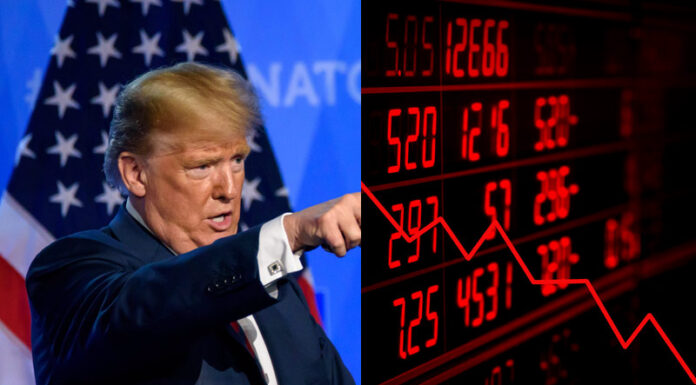Canadian businessman and “Shark Tank” star Kevin O’Leary is advocating for President Trump to take a tougher stance on China, suggesting that imposing a 400% tariff on Chinese imports would be an appropriate measure amid escalating trade tensions between the two economic powerhouses.
O’Leary characterized the ongoing trade dispute between President Trump and Chinese President Xi Jinping as a dangerous game of brinkmanship.
“Xi and Trump… it’s a game of chicken. Two cars coming at each other. You’re gonna have to resolve it,” O’Leary said, highlighting the high-stakes nature of the trade negotiations.
The investor praised Trump’s approach in handling trade negotiations with China, suggesting that the administration needs to maintain pressure to achieve meaningful concessions from Beijing. O’Leary emphasized that the issues at stake go beyond simple trade considerations.
“This China stuff is getting crazy, but I like the fact that [Trump is] squeezing this deal… we’ve got to resolve it’s not about trade anymore with China,” O’Leary explained. “It’s IP rights. It’s access to their markets. It’s Chinese companies trading money on the American markets. China is so different than the rest of the trade stuff.”
O’Leary’s call for a 400% tariff on Chinese goods represents a significant escalation from the current 145% tariffs implemented by the Trump administration. The dramatic increase would be intended to force China to address longstanding issues regarding intellectual property theft and market access.
The businessman has been consistently vocal about what he describes as China’s unfair trade practices. He claims that since joining the World Trade Organization in 2000, China has systematically ignored intellectual property laws, resulting in substantial financial damage to American businesses, particularly smaller enterprises.
O’Leary contends that China’s actions have devastated countless American companies through intellectual property theft. He believes China has been “cheating, stealing, and ripping off of IP” for years.
While O’Leary’s position on trade with China aligns with the Trump administration’s tough stance, it stands in contrast to warnings from many economists and business leaders who caution that excessive tariffs could harm the U.S. economy.
In recent days, President Trump has indicated a potential softening in his position. He told reporters that while the current 145% tariffs on Chinese imports would “come down substantially,” they would not be eliminated entirely, suggesting some room for negotiation while maintaining pressure on Beijing.
Treasury Secretary Scott Bessent has also hinted at a possible de-escalation, acknowledging that the high tariffs were not sustainable in the long term. These statements have provided some relief to financial markets concerned about prolonged trade hostilities.
The International Monetary Fund has expressed concern about the economic impact of continued trade tensions. IMF Director Kristalina Georgieva has called for a truce in the escalating conflict, noting that “uncertainty is very costly” and emphasizing the necessity of reaching a trade policy settlement.
The trade war has already had tangible effects on businesses in both countries. Chinese companies like Sorbo Technology and Guangdong Sailing Trade Company have reported significant drops in sales to the U.S. market due to the high tariffs. Workers in manufacturing hubs such as Guangzhou have experienced reduced wages and job insecurity as exports slow.
Despite these impacts, O’Leary remains focused on protecting American businesses, particularly small and medium-sized enterprises that he sees as the backbone of the U.S. economy.
“Let’s remind everybody that 62% of jobs in America are created by small companies, five to 500 employees,” he said. “That is the essence of the American economy. They are the economy.”
China has responded defiantly to U.S. tariffs, imposing its own retaliatory measures and stating that the American trade war “will end in failure.” Chinese officials have indicated they are not interested in a prolonged conflict but are unwilling to back down from what they perceive as economic aggression.
Meanwhile, China is actively working to strengthen trade relationships with other partners, including Malaysia and the European Union, potentially reducing its economic dependence on the U.S. market.
O’Leary’s support for Trump’s approach comes amid a complex interplay between trade policy and monetary policy. The businessman also weighed in on the President’s public friction with Federal Reserve Chair Jerome Powell regarding interest rates, though he emphasized that resolving the China situation should take priority.
As negotiations continue behind closed doors, the outcome remains uncertain. The Trump administration’s goal appears to be securing concrete concessions from China on intellectual property protection, market access, and other structural issues, rather than simply reducing the trade deficit.
For O’Leary and other proponents of tough measures against China, the current tension represents a necessary phase in rebalancing what they view as decades of uneven economic relations. Whether the “game of chicken” will result in a comprehensive agreement or further economic fallout remains to be seen.








